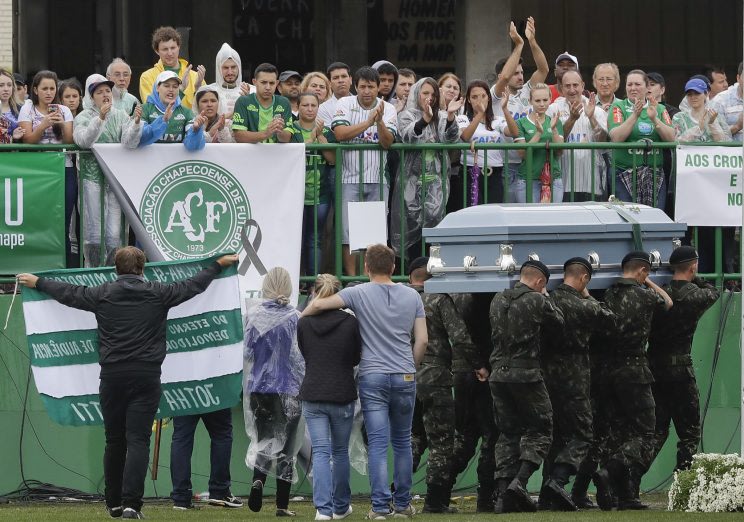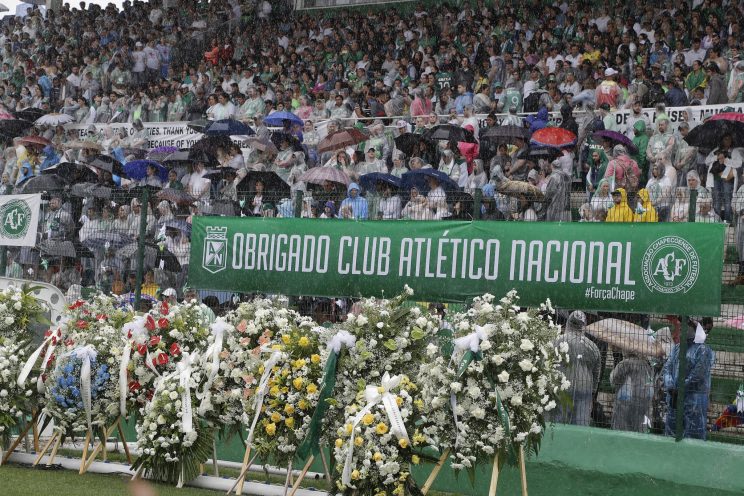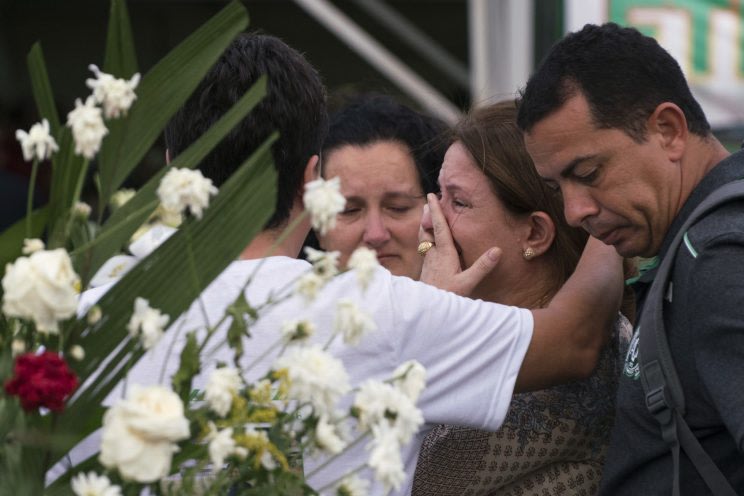The boys arrived home on Saturday. The people were all waiting for them.
A few fans went to the airport. Hundreds more lined up in the pouring rain along the roadway into town, huddled under store overhangs or on street corners. Thousands got to the stadium early in their ponchos and their jerseys, soaked through even by the time they found a place to stand.
Every single one of the people in this small city carried memories of the Chapecoense soccer team – celebrating a goal or sprinting up the pitch or singing in the victorious locker room. On Saturday there would be another memory, an impossibly sad memory, of the players being carried across the field in coffins.
Less than a week ago, the team left for Colombia to chase their improbable football hopes in the Copa Sudamericana. They had risen to the elite Series A level only two years ago, and they had a chance at their first ever title of any kind. But their charter plane crashed in Medellin, killing 19 players and the entire coaching staff. Twenty-one journalists also died in the accident. Of the 77 who boarded that flight, only six lived.
Six days later, military transport planes carrying their bodies landed in a wet haze back in Chapeco. Fans gathered along the window of the airport café, peering out as tears leaked down their faces. Some of the airport workers, normally there to move a jet stairway or help with baggage, also broke down. The planes parked and a rear door slowly opened. The caskets were carried out by military, one by one, and moved gradually toward families waiting in the terminal. There they would board buses for Arena Conda in the center of the city.
About a mile down the airport road, Elsa Bastos and her family stood under the shelter of a bus stop. They just wanted to say goodbye, to be part of this unbearable moment.
“All of Chapeco is morbid,” she said in Portuguese.
 |
Military carry a coffin with the remains of a Chapecoense soccer team member during funeral ceremony at the Arena Conda
|
As the morning went on, local television coverage shifted between scenes of the procession winding toward the stadium, fans crying in the stands, and highlights of the team scoring goals. On the field, platforms were set up for the caskets, with photos of players in their jerseys marking each one. A huge banner read, “In darkness and difficult hours, our hurricane will always be winners.”
Sirens wailed as the procession drew near, but there was no need for that; everyone knew the buses were coming.
The coffins were carried into the stadium, one after the other, each drawing a swell of sad applause. Soldiers blinked away the driving rain as they held the coffins up, their black boots sloshing through the widening puddles on the field. There were also soldiers stationed with flags along the way from the entrance of the field to the platforms, and each saluted as a fallen player moved past. As they did so, their boots made tiny splashes. Each coffin was lowered gradually to its platform, and then family surrounded the lost loved ones, some leaning over and embracing the caskets with both arms.
 |
Chapecoense soccer fans attend a funeral ceremony in tribute for victims in Colombia of an air crash. (AP)
|
The memorial began. A band played, fans sang, green smoke wafted through the supporters section, little children in Chapecoense jerseys brought out the Brazil and Colombia flag. It had so many of the traditions of the game itself, and they all meant so much more this time, because never again would those traditions mean what they had always meant. The team, formed in 1973, was referred to over the PA system as a “little child,” growing up and becoming strong right before the town’s loving watch. “They left for a dream,” the town’s mayor said, “and they came back as a legend.”
A few mourners lined up on the field with white balloons, and one was released as each name of a player was read. In these moments the rain finally let up noticeably, as if the sky paused to accept the offerings. Then the balloons disappeared from view, and it rained harder.
“Forca Chape!” the crowd in the stadium started to sing as one, and a video played of the team doing the same. Video tributes were shown from players around the country, including Neymar. “Forca Chape,” they all said, but quietly.
The team song played and the families left the dryness of the tent, walking around the stadium to thank the fans. They carried photos of those they had lost, some sobbing so heavily that they could not keep their eyes open as they walked. One man cried into his son’s old jersey. One woman could hardly hold her photo aloft.
The family of Danilo, the beloved goalkeeper, left the circle of walkers and headed to say one last goodbye to the net he protected so fiercely. They entered the goal and stayed there for a long moment, as if shielded by it. Fans cheered and serenaded them, chanting “Danilo” just like when he was here, and the goalkeeper’s loved ones cried even more.
Then it was time to go. Many fans didn’t want to leave, and so they stayed there in the stands, looking at the empty field. There will be soccer here again, but every home team will play in the shadow of the group the people of Chapeco loved and lost. Every extra minute on Saturday was a way to keep that team here a little bit longer.
“This is the place we came to cheer and be happy, and now it’s a place of sadness,” said Andre Bertano, draped in the team flag in the front row. “It’s empty, so empty.”
Outside of the stadium, Rosangela Loureiro stood on a sidewalk as friends came to console her. Seventeen years ago she met the man she would marry, a soccer player named Cleber Santana. They raised two boys together, and traveled the world as he played for several clubs. They finally found a home here, and Cleber was named captain of the team. Now he is gone, and his sons don’t quite understand what has happened to their dad. Rosangela holds the photo of her husband. He’s smiling so broadly.
“He was the best father, the best husband, the best man, the best everything,” she said in Portuguese. “He was amazing.”
Rosangela recently had gotten a tattoo, in preparation for a December trip to Punta Cana. The tattoo is of an airplane, drawing the shape of a heart.
“I am waiting for him to call,” she said, “waiting for him to come home.”
 |
Relatives of Sergio de Jesus cry in front of flowers dedicated to him during a gathering at the Chapecoense soccer team’s stadium. (AP)
|
No comments:
Post a Comment